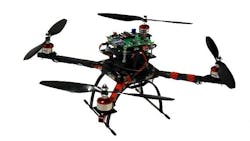FAA to establish center of excellence to conduct research into unmanned aircraft issues
FAA officials say they will establish the Center of Excellence (COE) for Unmanned Aerial Systems (UAS), and conduct a competition to determine the organization that runs it.
Representatives of the FAA's W.J. Hughes Tech Center in Atlantic City, N.J., last week released a presolicitation (13-C-UAS-PRESOL) to establish the FAA Center of Excellence (COE) for Unmanned Aircraft Systems (UAS). The FAA is a bureau of the U.S. Department of Transportation in Washington.
Related: FAA's impending rule on small UAVs may usher in a new era of civil aerial warfare
The FAA initially will issue cooperative agreements to selected university teams, as well as define and pay for UAS projects through matching grants over the life of the COE, which will be responsible for matching all money granted to establish, operate and conduct related research, and may contract with others as appropriate, officials say.
The FAA Administrator will choose the COE team based on how well the applicant can:
-- represent regional needs of the applicant's home state;
-- lead on national and regional issues involving UAS and aviation;
-- run an established air transportation program;
-- disseminate pertinent research through regional continuing education programs; and
-- carry out its proposed research projects.
FAA officials primarily are interest in carrying out UAS-related research in air traffic control interoperability; airport ground operations; command and control (C2); detect and avoid (DAA); human factors; system performance; privacy practices for UAS operations; system engineering; unmanned aircraft pilot training and pilot certification including other unmanned aircraft crew members.
FAA officials want to attract COE members such as industrial groups, government agencies, and colleges that want to work together on research aimed at solving UAS-related problems. These organizations may be considered as affiliate members by the COE core universities and may provide matching contributions and receive funding from the COE.
Related: GE Aerospace, FAA, to study how to integrate UAVs into U.S. national air space
In May the FAA will issue a draft solicitation, take public comments, and conduct a public meeting in the Washington, D.C., area to discuss the COE and UAS technical requirements. More information is on the COE UAS Website at http://faa-uas-coe.net.
For questions or concerns contact the FAA's Jessica Shaw by phone at 202-385-6727 or by email at [email protected].
More information is online at https://www.fbo.gov/spg/DOT/FAA/WJHTC/13-C-UAS-PRESOL/listing.html.
